- Home
- Helen Fielding
Olivia Joules and the Overactive Imagination Page 4
Olivia Joules and the Overactive Imagination Read online
Page 4
* * *
Olivia dived back to the desk and hit her sleek titanium iBook with a sudden frenzy.
“In the capital of England the worlds of fashion, music, TV, theater, movies, literature, newspapers and politics combine in one small city like a writhing knot of snakes. In America these areas are separated out into capitals of their own. Traditionally, it was politics in Washington, literature, arts and fashion in New York, entertainment in LA. But within the last few years Miami—formerly the capital of guns, shady business dealings, smugglers and sun-seeking geriatrics—has exploded onto the capital-city scene in a burst of hot light, art deco and leopardskin as the center of extravagant cool, with the glitz of music, fashion and entertainment increasingly drawn there as if by the force of a giant pink and ice-blue magnet.”
There. She would rephrase it and start with a bit of color. The phone rang. It was Melissa, the PR girl, “just asking” how she was getting on with the article and checking that she was coming to Pierre Ferramo’s “little gathering.” Olivia tried to type with one hand, the phone tucked under her chin, desperately waiting for a gap between sentences which never came. No sooner had she got rid of Melissa than the phone rang again. This time it was the commissioning editor from Elan, in a leisurely mood, wanting to talk more about the OceansApart: the angle, the length, the style, people who might be good for interviews. It was nearly five o’clock. It was hopeless, hopeless. Why the fuck had she got herself into this mess? She was doomed—doomed to write articles beginning: “Suddenly there are more hats everywhere!” She would never be allowed out of the office again.
6
Back in London, in the Sunday Times office, Barry Wilkinson was pacing in front of the big old-fashioned clock, cursing Olivia.
He watched, furious, as the second hand clicked towards eleven o’clock, poised to pick up the phone.
“Okay, the silly cow’s flunked. We’re going to have to run the standby.”
Barry’s deputy burst into the room brandishing a printout. “She’s filed it!”
“And?” said Barry, witheringly.
“It’s great,” said the deputy.
“Humph,” said Barry.
* * *
Meanwhile, Olivia too had been glancing furiously at the clock as she tried to get ready in a negative amount of time. Why did people in America do everything so bloody early? Lunch at noon. Dinner at seven. It was like being back in 1960s Worksop except that she was headed for a party hosted by either a perfumier slash producer or a terrorist, depending whether she was mad or not.
She was ready within minutes. Eight years earlier, as part of the Rachel-to-Olivia metamorphosis, she had made one supreme effort to change herself from plump to thin, to arm herself with a great body as a useful tool in life. What had startled her was how differently the world had treated her old plump self and her new thin self. It was then that she realized she could manipulate reactions. If you wanted to create a stir and have everyone notice you, that wasn’t so hard. You just wore something very small and attention-seeking, like a wannabe movie star does at a premiere. If you wanted no one even to realize you were there: ill-fitting jeans with hankies in the pockets, flat shoes and a baggy sweatshirt, no makeup, glasses, and hair all over the place. She became, in her instinctive way, a master of disguise. Dressing was all about uniforms and codes. People didn’t look much beyond that outside Worksop, until you got to know them, if you ever got that far.
* * *
Tonight, she decided, she needed a look which was attractive, but not so tarty as to offend any possible Muslim sensibility (tricky), and shoes which enabled one to walk or at least stand still without getting blisters. She had packed her rich, attention-seeking uniform (designer slippy things, enough posh jewelry to carry off some flashier fakes) and also her usual equipment: pepper-spray pen, spyglass, hatpin (an old fail-safe of her mother’s to counter would-be assailants) and survival tin, of course.
After a very small number of attempts, she arrived at a simple pale slip dress and a Pucci wrap to cover her shoulders. She thought about covering her head as well, then realized she was getting carried away. She gave her reflection a rousing, almost cheerleader-like smile, and called downstairs for a cab. At the last moment, she stuffed the hatpin, pepper spray and survival tin into the Louis Vuitton clutch along with her miniature address book, just in case.
She flicked on CNN before she left to see if anything exciting had happened. They were doing a story about a time capsule from fifty years ago being discovered in a school.
“A message from the past”—dramatic pause—“from those who lived in it,” concluded the presenter sententiously. Olivia loved the CNN riddle-me-ree phraseology: “He’s tall, he’s bad and he hid in a hole—Saddam Hussein!” “It’s wet, it’s see-through, but without it we’d die: waterrrrr!” Then her eye was caught by the text strip running underneath the pictures: alongside “Yankees 11, Red Sox 6” it read: “Osama bin Laden sighted in southern Yemen. Sources call sighting ‘conclusive.’ ”
She stared at it, blinking. “Oh,” she said eventually. “Oh dear. Though, obviously, that’s good.”
7
Olivia’s feelings of sheepishness escalated as she arrived at Ferramo’s apartment block and realized she had been expecting a cross between an overpriced Knightsbridge hotel and the interiors favored by Saddam Hussein in his early promotional videos: fitted carpets, square beige sofas, stilted flower arrangements in front of long net curtains, curly gilt chairs and bulbous lamps. In her fevered mind, Ferramo had sprouted a beard, a turban, flowing robes and a Kalashnikov. She was expecting sweet Middle Eastern musks and perfumes, Turkish (for some reason) delight and Ferramo sitting cross-legged on a prayer mat next to one of the bulbous lamps.
But the block was an ultramodern building, the public areas designed in a ruthlessly minimalist style with a nod in the direction of the nautical—everything was white or blue and dotted with porthole accents, i.e., round things. There were no bulbous lamps or curly chairs. Pierre Ferramo’s penthouse occupied the entire nineteenth and twentieth floors. As she stepped out of the white metallic be-portholed elevator, she gazed awestruck at the spectacle in front of her.
The twentieth floor was one vast, glass-walled room, leading out onto a terrace which overlooked the sea. An illuminated lap pool—bright electric blue—stretched the entire length of the terrace. At the back of the room, through one of the walls of glass, the sun was setting behind the Miami skyline in a flamboyant burst of oranges and salmon pinks.
Ferramo was seated at the head of a vast white table, where a card game was in play, an almost palpable air of gravitas and power emanating from his dark, elegant figure. Behind him, the tall Indian model was resting a hand, consortlike, on his shoulder. Her long black hair shone against a pure white evening dress, the whole effect set off by a dazzling array of diamonds.
Olivia looked away, ashamed, afraid that Ferramo somehow knew what lunacies had been running round in her brain. He looked like a clever, dignified businessman: a rich man, a powerful man certainly, but not a terrorist. Thank God she hadn’t said anything specific to Barry.
“Your name?” said the boy at the entrance, holding out a list.
“Olivia Joules,” she said, fighting the urge to apologize, just in general.
“Ah yes, come this way.”
The young man led her to a waiter holding a tray. She carefully selected a glass of sparkling water—no drunken fuck-ups for her tonight—and looked round the room, reminding herself: No one is thinking about you; they’re thinking about themselves, just like you.
Two young girls in T-shirts and tight jeans, the waistbands almost indecently low, were exchanging air kisses. She recognized them as the girls who’d been posing, S-shaped, on the red carpet the night before.
“Oh. My. God.” One girl’s hand shot to her mouth. “I have that T-shirt.”
“You’re kidding me.”
“The exact same T-shirt.”
&n
bsp; “Where did you get it?”
“The Gap.”
“So did I! I got it in the Gap.”
“Oh. My. God.”
The two girls stared at each other, overcome by this almost magical coincidence.
“Hi. How do you two know each other?” Olivia ventured with a friendly smile, fighting down the sense of being the most unpopular girl in the playground. Would that she had the Gap T-shirt too.
“Oh, we both work at—”
“We’re actresses,” snapped the other. They, like the T-shirts, were almost spookily identical: big breasts, tiny hips, long blond hair, brown pencil outlining their glossed collagen pouts. The only difference was that one was much prettier than the other.
“Actresses! Wow,” said Olivia.
“I’m Demi,” said the less pretty one. “This is Kimberley. Where are you from?”
“England.”
“England. Is that London?” said Kimberley. “I want to go to London.”
“You’re lucky, living here.”
“We don’t live in Miami, we’re just visiting. We’re from LA. Well, not from LA.”
“My family’s part Italian, part Romanian and part Cherokee,” explained Kimberley.
“Olivia,” she said, shaking hands and feeling awfully English. “So you’re just visiting? Are you working here?”
“No,” said Kimberley airily, pulling at her jeans. “Pierre just flew us over for the launch.”
“Generous guy.”
“Yes. Are you an actress?” said Kimberley suspiciously. “Do you know him from Paris?”
“Can’t act for toffee. I only met him last night. I’m a journalist.”
“Oh. My. God. Which magazine are you from?”
“Elan.”
“Elan? That’s British Elan, right? You should come to LA. You should give us a call. You could maybe do a profile on us.”
“Okay,” Olivia said, taking her little book out of her bag, hiding the survival tin. “What’s the number?”
The two girls looked at each other.
“Actually we’re between addresses at the moment,” said Demi.
“But you can reach us through Melissa. You know, who does Pierre’s PR.”
“Or you can ring us at work, at the Hilton.”
Kimberley looked furiously at Demi. “We’re just working there temporarily,” she said sharply, “to keep us busy between auditions and rehearsals.”
“Of course. Which Hilton?”
“The Beverly Hilton?” said Demi eagerly. “On Santa Monica and Wilshire? Where they hold the Golden Globes? I usually get to host the ladies’ powder room during the Globes. It’s awesome: four makeup stations, every kind of perfume. All the big stars come in for touch-ups: Nicole Kidman, Courteney Cox, Jennifer Connelly, you get to meet them close up.”
Oh, for God’s sake. Osama bin Ferramo indeed. He was just a playboy . . .
“Wow. What’s Nicole Kidman like?” said Olivia.
“Oh my God,” said Demi, hand to her heart.
“But actually”—Kimberley leaned forward conspiratorially—“we’re going to be starring in the movie Pierre’s producing. You’ve heard about that . . .” . . . a cynical playboy, playboying on the dreams of innocent little wannabes.
“May I interrupt you, ladies?”
Olivia turned. A short man had joined them, dark chest hair protruding from a yellow polo shirt. The chest hair, like the hair on his head, was very tightly curled, like pubic hair. He smelled of nasty sweet perfume. He held out his hand, glancing at her breasts. “Hi, baby. Alfonso Perez. And you are . . .”
“Olivia Joules,” she said coldly. “I met Pierre last night at the Devorée launch.”
“Ah yes. And you are an actress too? Perhaps we can find a role for you?” He had a thickly accented voice with heavily rolled r s.
“No, thanks. I can’t act my way out of a paper bag.”
“That’s funny,” said Kimberley. Why did Americans say “That’s funny?” They said it instead of laughing, as if funniness were something you observed from afar rather than something you participated in.
“Really, Ms. Joules? You do not wish to be an actress?” It was Ferramo.
There was a collective intake of breath from Demi and Kimberley. They gazed, lip-lined pouts momentarily ajar. Pierre Ferramo’s legs were encased in neatly pressed blue jeans. His shoulders looked broad in a soft gray cashmere sweater. Olivia forced herself to breathe normally and looked into the dark, penetrating eyes. He raised his eyebrows quizzically.
“I tried acting once. I was given some roles in a comedy revue. One by one all my parts were taken away from me, apart from that of Miss Guided, the mute chambermaid.”
The wannabes and the little oily man looked at her, baffled.
Ferramo showed a glimmer of amusement. “You will excuse us?” he said to the group, taking her arm and beginning to guide Olivia away.
As the wannabes glowered, Olivia had to fight down playground-level feelings of smugness and one-upmanship, feelings she deeply disapproved of in any circumstances. Divide and rule. Ferramo was dividing his roost of girlies in order to rule it.
A waiter hurried up with a tray of champagne.
“Oh, no thank you,” said Olivia quickly as Ferramo handed her a long-stemmed glass.
“But you must,” he murmured. “It is French. It is the finest.”
Yes, but are you? His accent wasn’t easy to place.
“Non, merci,” she said. “Et vous? Vous êtes français?”
“Mais bien sûr,” he said, with an approving glance. “Et je crois que vous parlez bien le français. Vous êtes, ou—je peux?—tu es une femme bien educatée.”
I wish. Worksop Comprehensive, she thought, but merely smiled mysteriously, asking herself if educatée was a proper French word and resolving to look it up later.
Olivia had an ear for languages, and had discovered that even when she couldn’t speak a foreign tongue, she could often understand it. Even if the words were double Dutch, she could usually guess at what the person might be saying, or figure it out through her sensitivity to nuances of expression. There had been a time when her lack of university education had made her sad, so she had made up for it herself. With books and tapes and visits she had developed fluency in French and passable Spanish and German. A couple of visits to the Sudan and the Muslim islands of Zanzibar and Lamu had given her the rudiments of Arabic. Unfortunately, the world of style-and-beauty journalism was not giving her much chance to use all this.
Taking a large swig of champagne, Ferramo led her through the party, ignoring the bids for his attention. It was like being with the star at a film premiere. Eyes followed them, particularly those of the tall Indian beauty. “But of course, Ms. Joules, the French are not exactly populaire in your country,” he said, leading her onto the terrace.
“Nor in this,” she laughed. “ ‘Cheese-eating surrender-monkeys,’ Homer Simpson called them.” She looked up at him, smiling while gauging his reaction. He leaned against the cruise-ship-type railing and smiled back, gesturing for her to join him.
“Ah, Monsieur Simpson. The fount of all human wisdom. And you? You were at one with the French sensibilité?”
She leaned on the cool metal rail and looked out to sea. The wind was still raging. The mood appeared from time to time behind ragged, racing clouds.
“Were you?” she asked.
“I was ashamed of my countrymen.” Yes, but which countrymen? “And you? What was your position?” Why was he asking her this?
“I always find it a bad idea to talk politics at parties.”
“Not when asked for an opinion directly, surely.”
“I was against the invasion.”
“You were? And why was that?”
“Well, since you ask: there was no evidence of weapons of mass destruction, there was no connection between Saddam Hussein and al-Qaeda or September 11, and they were punishing a breach of international law by breaking internationa
l law themselves. I thought it was mad, unless there was something they weren’t telling us, which it turns out there wasn’t.”
“You are right,” he laughed, “you are not an actress.”
“Because I’ve got an opinion? That’s a bit sweeping, isn’t it?”
“Actors. Do you know that, every day, over five hundred young people arrive in Los Angeles, expecting to be actresses, flocking after fame and wealth like so many locusts? There is nothing else of value in their lives.”
“You seem to have taken rather a lot of them under your wing.”
“I wish to help them.”
“Sure you do.”
He glanced at her sharply. “It is a brutal profession.”
“Pierre?” The tall Indian beauty came out onto the balcony and touched him possessively on the arm. She was accompanied by a good-looking, well-toned man of maybe forty with a wide smile which turned up at the edges—a cross between that of Jack Nicholson and Felix the Cat. “Can I introduce you to Michael Monteroso? You remember, the genius facial technician who’s been helping us? He’s the toast of Hollywood,” she added, wrinkling her nose at Olivia in an attempt to be girlishly conspiratorial. “Backstage at everything.”
For a fleeting second a look of contempt crossed Ferramo’s fine features, then he composed his face into a gracious smile.
“But of course, Michael. A pleasure. I am delighted to meet the maestro at last.” Monteroso and he shook hands.
“And may I introduce my friend from London, Olivia Joules,” said Ferramo. “A writer of great distinction.” He pressed her arm as if to suggest a shared joke. “And, Olivia, this is Suraya Steele.”
“Hi,” Suraya said coolly, running her hand through her hair at one temple and flicking back the long shiny curtain so that it cascaded over her shoulders. Olivia stiffened. She hated women who did hair-flicking. It seemed so sneakily vain: disguising hair smugness and “everybody look at me and my lovely hair” attention-seeking as hair tidiness, as if they were flicking their hair back simply to keep it off their faces. In which case why not use a kirby grip or a sensible Alice band?

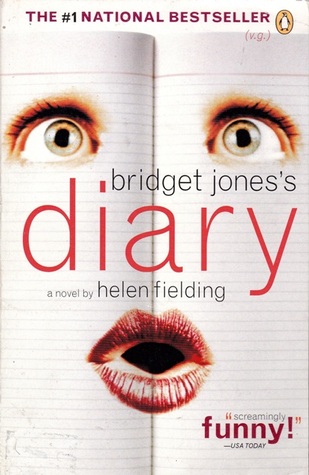 Bridget Jones's Diary
Bridget Jones's Diary Bridget Jones's Baby: The Diaries
Bridget Jones's Baby: The Diaries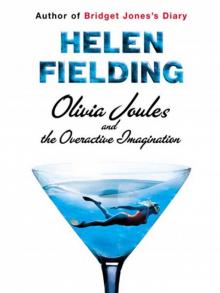 Olivia Joules and the Overactive Imagination
Olivia Joules and the Overactive Imagination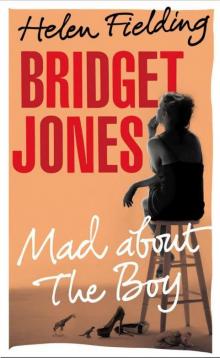 Mad About the Boy
Mad About the Boy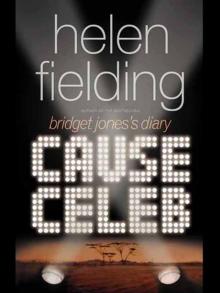 Cause Celeb
Cause Celeb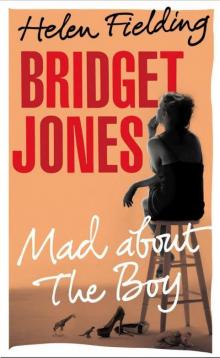 Bridget Jones: Mad About the Boy
Bridget Jones: Mad About the Boy The Edge of Reason
The Edge of Reason Bridget Jones's Baby
Bridget Jones's Baby